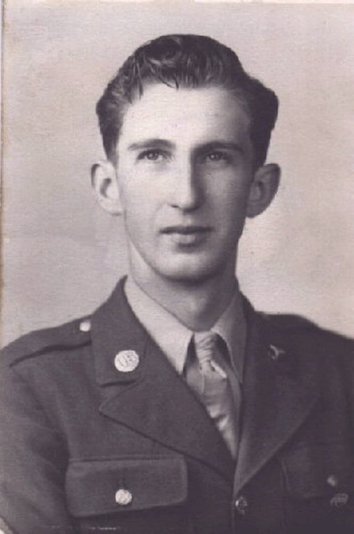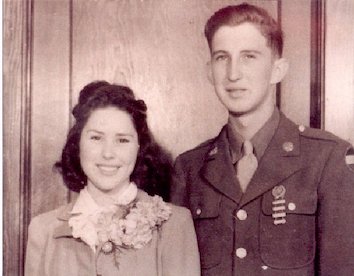May is Older Americans Month. I happen to have an amazing older American in my life, W. C. Carter of Eudora, Kansas, who is affectionately known as Uncle Dub. At 97 years old, he is the patriarch and the only living relative of the older generation in my family.
Still independently living at home, he possesses wit, humor, a grateful heart of compassion, and a quick mind. He is a man of faith who is determined to continue giving back to the community. Uncle Dub has inspired me for years, so I would like to share snippets of his story with you.

Uncle Dub is a survivor and thriver. He lived through a near fatal infection, a broken home, an attempted kidnapping, the Dust Bowl, and World War II. His marriage to his sweetheart, Dorene, is a love story that rivals The Notebook. Despite his humble beginning, he received a college education through the GI bill and spent his life giving back to the community, his family, and his church.
Uncle Dub’s earliest memory is waking up in a hospital bed at the age of three with a drain on his side. He had developed an abscess on his lung, and the doctor had chipped a hole in his rib to insert a drain. This was in 1928, before penicillin and germ killers. “It is a miracle I survived!” Uncle Dub said.
The year before this incident, Uncle Dub’s father left, and Dub was sent to live with his grandparents. “It was a messy divorce,” he said. “I remember one time when my father came for visitation and took me out of state and went off with me. My grandfather tracked me down and came and got me.”
When Uncle Dub was almost six, his mother re-married, and he went to live with his mother and stepfather. This was during the Dust Bowl, and it was very hard to make a living. Uncle Dub attended ten schools between kindergarten and fifth grade as his family moved around to different places in Arkansas and Oklahoma while his stepfather was trying to find work. His stepfather owned a pickup truck and would haul things for a living but was barely able to earn enough to feed his family.
Though they were poor, Uncle Dub learned to play the guitar and began singing at a young age. Music became his passion.
Growing up during the Dust Bowl made a huge impression on Uncle Dub. He remembers the government paying farmers a dollar a piece to shoot their cows because they were starving and there was no food for them. They would bury them with a bulldozer in a big trench. “They were no good for food since they were all skin and bones and there was no meat on them,” he explained.
Another vivid childhood memory was attending the funeral of the notorious bank robber Pretty Boy Floyd when he was nine years old. Uncle Dub was living in Sallisaw, Oklahoma, across the street from Floyd’s brother and remembers playing with his son. “He was, for lack of a better word, well respected in that town. He was famous for robbing the banks and giving it away to the poor people,” Uncle Dub said.
“I was in the procession to go up to see the casket... It was so packed with people I was smothering. I had to turn around and get out.” What little Dub didn’t understand at the time was that he was a participant in a truly momentous event in history. One account estimates Pretty Boy Floyd’s funeral as having between 10,000 and 40,000 in attendance and describes people getting “elbowed and pushed” (Harvey).
In another article, Floyd’s nephew describes the funeral as the “most raucous funeral in Oklahoma history” (Ingram).
Uncle Dub’s life settled down in the fifth grade when his family moved to Paris, Arkansas, where they stayed until he graduated from high school. This is where he became friends with the Brewer family (my father’s family). From seventh grade on, Uncle Dub began attending youth group at the Brewer’s church. This is where Uncle Dub became serious about his Christian faith. For the first time, he realized that Jesus was the Son of God and he asked Him to forgive His sins. This was a turning point of faith for him.
It wasn’t until Uncle Dub was a junior in high school that my father’s sister, Dorene, became more than a friend. Uncle Dub and Dorene had both shown up at a carnival by themselves. They ran into each other and realized that they each had a quarter to spend. Dorene handed Dub her quarter and said, “Let’s spend our quarters together.”
They rode on the whirling swings and the tilt-o-whirl, and still had enough left to buy an ice cream and popcorn. By the end of the evening, Dub was smitten. He never had another girl in his life.
After they graduated from Paris High School, Dorene left for Little Rock to go to business school, and Dub was drafted into the army. His induction to the army was in Little Rock, so they were able to spend some time together there. Then, when he had his first leave, on March 15, 1944, they got married. Dorene’s mother was opposed to the wedding and threatened not to come. “I have to pick potatoes that day,” she told her daughter.
“Then we’ll just have to get married in the potato patch!” Dorene answered.
Mrs. Brewer changed her tune and showed support to her daughter by taking her out and buying her a new dress.
After the wedding, the newlyweds had three days together before Dub had to leave for California. Dorene joined him five months later after she graduated from school.

Uncle Dub became a medic in the army. One of his assignments was to transport wounded soldiers by train to hospitals near their families. He would start in California, dropping soldiers off along the way and end up in New York. On one such trip, Dub requested a day pass to tour New York City. As he was walking through the streets, the shop owners started boarding up their stores, and people were pouring into the streets. He ended up in a huge crowd in Times Square where a banner was displayed stating that the war was over in Europe. People were cheering and waving flags. Uncle Dub remembers this as the backdrop of the famous photo taken of a sailor kissing a girl. Once again, Uncle Dub found himself a part of a truly historic moment.
After the war, two million returning soldiers flooded the job market. “All men between the ages of 17 to 60 had been drafted. It was a really a problem for men to get back into the work force. There were no jobs to be had,” Uncle Dub said.
Uncle Dub created his own job by buying a car and using it as a cab. That lasted for a year, then he followed his passion as a musician and played in a band in Scottsbluff, NE. The band did well, but it was too hard for him to be separated from his wife, so then he did something that he never thought he would be able to do. Using the GI bill, he enrolled in college at Arkansas Tech in Russellville.
Meanwhile, my father came back from the war, enrolled in college and started dating a beautiful young college student who lived only a block from the school. My mother hit it off with Dorene, and the four of them became the best of friends.
The transition to college was challenging for Uncle Dub. He failed the first paper he wrote. He went to see the teacher and she told him, “I’m not paid to teach high school English.” He then showed the paper to my father. My father analyzed it and gave Uncle Dub a few basic pointers about writing, and Uncle Dub never got lower than a B.
Uncle Dub finished both a BA and BS in three years and worked on his master’s degree in education while he worked as a band director.
Uncle Dub went on from being a band director and teacher to a principal and superintendent. This poor boy from a broken home who grew up in the Dust Bowl certainly did well!
Uncle Dub and Dorene raised a son and two daughters. He is so proud of them, along with his eight granddaughters and fifteen grandchildren. Uncle Dub and Dorene felt so blessed and wanted to give back, so they helped each of their granddaughters pay for their education.
They also started a fund to help anyone in the family who is going through a challenging financial time. I was shocked in 2008 when my husband lost his job to find a sizable check in the mailbox with a note from Uncle Dub. He told me about the fund and explained that my dad had helped them out early in their marriage, so this was his chance to give back. He told me to use whatever I needed with no expectation of paying it back. After my husband found a job and we got back on our feet, we returned the money to the fund for Uncle Dub to pass on to the next family member in need.
The love that Uncle Dub showed for his wife was admirable. I remember visiting Arkansas in 1990 when Aunt Dorene was battling ovarian cancer. Uncle Dub cared for her with such love and devotion. We almost lost her, but she went into remission.
Uncle Dub and Dorene enjoyed many good years together before Dorene began showing symptoms of another serious illness. At that time, he promised her that he would keep her at home.
I was able see his love for his wife firsthand when I brought my mother, my sister, and three of my children to visit him in 2015. By then Dorene required total care. But Uncle Dub was determined to keep the promise he had made to keep her at home. At ninety years old, he would scoop her little frame up and put her in her wheelchair, and then back in the bed. It was beautiful to see. “More inspiring than the Notebook,” I told him. Dorene passed away shortly after our visit.
What kind of advice can we glean from one who has lived so long and so well? When I asked Uncle Dub, he said the best advice is to be steadfast in your belief in Jesus Christ and His transforming power as stated in his favorite Bible verse: “For God so loved the world that He gave His only Son that whoever believes in Him should not perish but have eternal life.” John 3:16 (ESV)
And to remember that family is a precious gift never to be taken for granted.
It is such a blessing to have older adults to share their advice and personal histories. What older adults are in your life? I encourage you to reach out and discover the treasures of wisdom and stories they possess.
Works Cited
Oct. 2018, Harvey, Ian. “Pretty Boy Floyd's Funeral Will Always Be Remembered.” The Vintage News, 29 https://www.thevintagenews.com/2016/08/29/pretty-boy-floyd-oklahoma-funeral-will-always-remembered/?chrome=1.
Ingram, Dale. “Family Plot: Pretty Boy Floyd Relative Recalls His Infamous Uncle.” Tulsa World, 18 Oct. 2009, http://www.tulsaworld.com/news/article.aspx?subjectid=11&articleid=20091018_12_A1_Becaus425269.
**If you enjoyed this story, you might enjoy these stories about older Americans:
Elliot Brodie: Thriving in the winter season of life
Jonathan and Roseann Johnson: Retired Missionaries to Ecuador